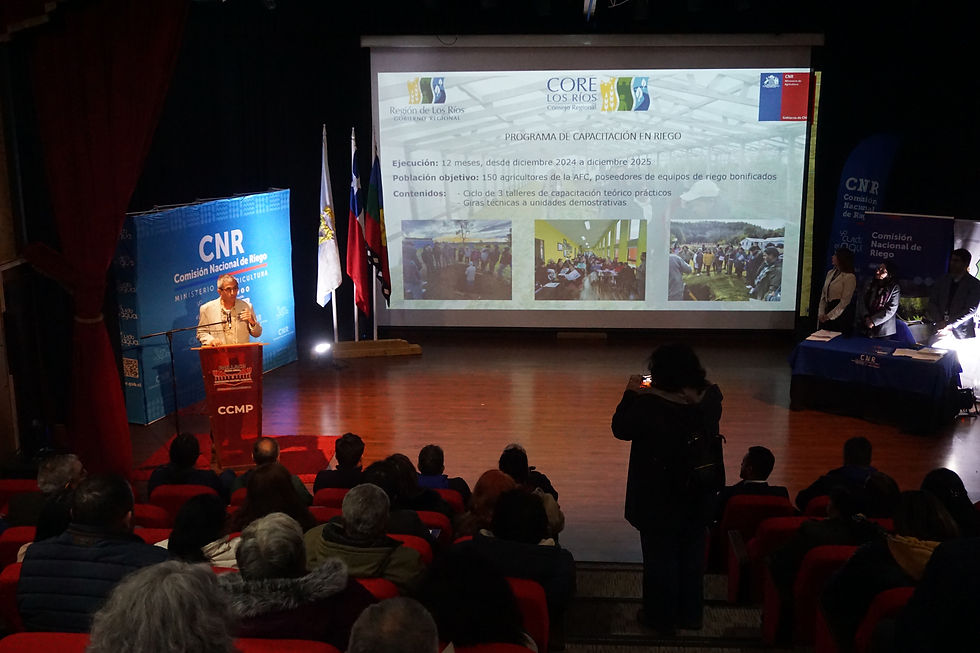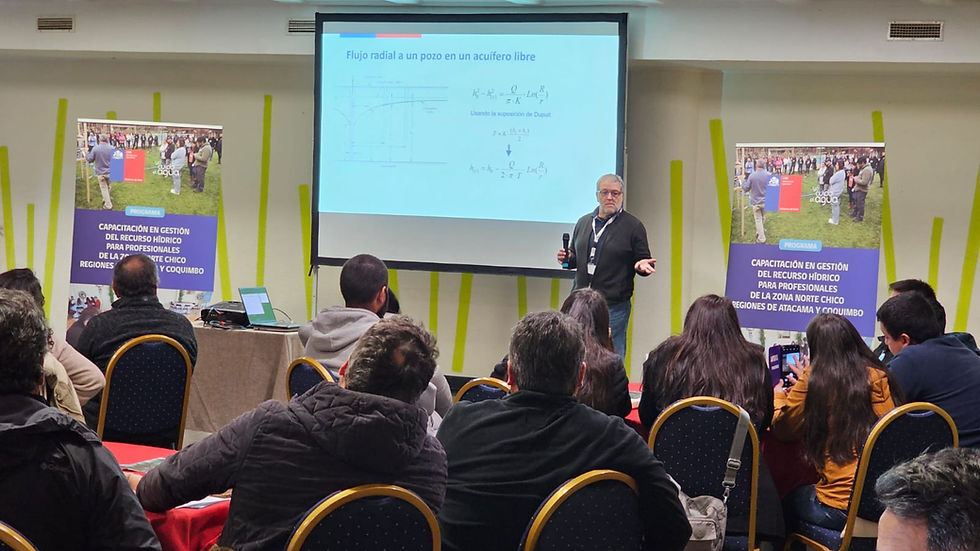Innovations and Challenges: Sustainable Groundwater Management
- Gabriela Marilicán - Periodista
- Jun 9, 2025
- 3 min read
Updated: Jul 21, 2025
Researchers, regional authorities, and relevant actors participated in a key event to learn about the role, organization, and importance of groundwater communities.

The seminar "Innovations and Challenges in Sustainable Groundwater Management: Experiences from Chile and California, United States," organized by the Water Technology Consortium (COTH2O), was held in the city of Quillota. The objective was to share national and international experiences on innovations and challenges in sustainable management to promote the creation and strengthening of groundwater communities.
The day began with a presentation by Ovidio Melo, a professor and researcher at the University of Concepcion, on the "Challenges in the Organization of Groundwater Communities." He indicated that the main challenges to date have been the difficulty in registering groundwater communities and incorporating new users after their formation, the lack of clarification regarding the competent courts, the limited progress made regarding the joint management of surface and groundwater, and the lack of public policies related to the formation of these communities.

The following presentation was given by Pamela Garay de la Fuente, head (s) of the Department of User Organizations of the General Directorate of Water (DGA) of MOP, who spoke about the “Role of the General Directorate of Water in the sustainable management of groundwater: advances and challenges.”

This was followed by a presentation on "Experience of the Copiapó Groundwater Community: Organized to Improve Groundwater Management," led by Carlos Araya, Groundwater Community (CASUB); María Carolina Veroitza, CAS 4, and María Fernanda Prohens, CAS 123, members of Groundwater Communities. They explained the makeup of the communities, their constituents, the difficulties they have experienced, and an analysis of water extraction by water users, who are mostly farmers and mining companies.

To conclude the seminar, Samuel Sandoval, professor and water resources extension specialist at the University of California Davis, presented remotely "Experience in California: Groundwater, Sustainable Groundwater Management Act (SGMA)," providing concrete examples of the state of California's water supply and the undesirable outcomes to avoid with respect to sustainable groundwater management. He also invited participants to learn more about SGMA.
Felipe Mellado, Deputy director of Corfo Valparaíso, was present during the presentations. He emphasized the importance of these types of events and the importance of creating these opportunities to discuss water resources. "Water management is a highly relevant topic, therefore, developing activities like todays, where knowledge and tools are being provided, along with information regarding different methodologies and ways to optimize water use, is very powerful," added the Deputy director.

For her part, Pamela Garay, the acting head of the Department of User Organizations at the DGA, highlighted the DGA's work as the country's governing body for water resources, and particularly its role in groundwater matters. "We work in the various areas associated with groundwater management, from establishing groundwater use rights to establishing groundwater communities. Likewise, for integrated water resource management, we consider both surface and groundwater sources when developing Strategic Water Resources Plans for Basins. These management tools will provide a complete picture of a basin with measures and actions to address current and future water challenges. Their implementation should be prioritized by the members of the Strategic Water Resources Roundtables, made up of representatives from the public and private sectors and civil society," she stated.
The seminar, held in person and streamed on the Consortium's YouTube channel (COTH2O), was well attended, allowing attendees to participate in a panel discussion with the event's speakers after the presentations.

José Miguel, an attendee at the event who is also participating in the formation of a community in the city of Casablanca, appreciated the opportunity to learn more about groundwater communities. “It's always valuable to hear the experiences of those already operating. We, who are in this process, came to gather ideas and more contacts so that they can collaborate with us and hopefully continue working alongside those who already have experience, as guides or as partners, as advisors in this process,” he expressed.
The seminar made clear the importance of groundwater communities and their formation to improve water stewardship in our country.



Comments